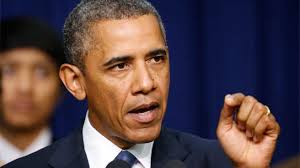U.S. President Barack Obama said on Thursday he was sending up to 300 U.S. military advisers to Iraq but stressed the need for a political solution to the Iraqi crisis as government forces battled terrorist groups country’s north.
 U.S. President Barack Obama said on Thursday he was sending up to 300 U.S. military advisers to Iraq but stressed the need for a political solution to the Iraqi crisis as government forces battled terrorist groups country's north.
U.S. President Barack Obama said on Thursday he was sending up to 300 U.S. military advisers to Iraq but stressed the need for a political solution to the Iraqi crisis as government forces battled terrorist groups country's north.
Speaking after a meeting with his national security team, Obama said he was prepared to take "targeted" military action later if deemed necessary, thus delaying but still keeping open the prospect of air strikes to fend off the militant attacks. But he insisted that U.S. troops would not return to combat in Iraq.
Obama also delivered a stern message to Iraqi Prime Minister Nuri al-Maliki on the need to take urgent steps to heal Iraq's sectarian rift, something U.S. officials say Maliki has failed to do and which the al Qaeda splinter group, the so-called Islamic State of Iraq and the Levant (ISIL) has exploited.
"Ultimately, this is something that is going to have to be solved by the Iraqis," Obama told reporters.
Obama, who withdrew U.S. troops from Iraq at the end of 2011, said the United States would increase support for Iraq's security forces. But he stopped short of acceding to Baghdad's request for the immediate use of U.S. air power against ISIL.
The contingent of up to 300 military advisers will be made up of special forces and will staff joint operations centers for intelligence sharing and planning, U.S. officials said.
Moreover, Obama did not join calls for Maliki to go, saying "it's not our job to choose Iraq's leaders.
"Only leaders with an inclusive agenda are going to be able to truly bring the Iraqi people together," he said.
The U.S. president also said he was sending Secretary of State John Kerry to Europe and the Middle East starting this weekend for talks he hoped would stabilize the region.
Obama's decision to deploy military advisers and deepen U.S. re-engagement in Iraq came after days of arduous deliberations by a president who won the White House in 2008 on a pledge to disentangle the United States from the long, unpopular war there.
He said that recent days had reminded Americans of the "deep scars" from its Iraq experience, which started with the 2003 U.S.-led invasion that toppled Saddam Hussein and saw U.S. troops occupy the country for eight years.